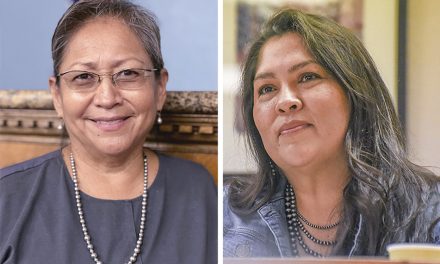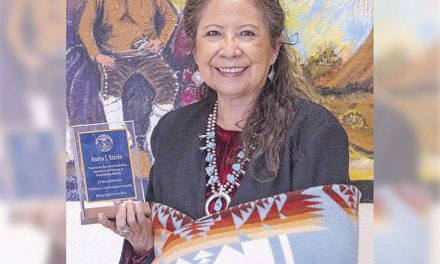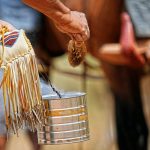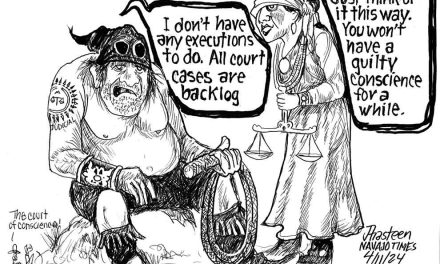
Letters: We need more strong, young, educated leaders

The problems with those who created for their people on orderly election process needs to be solved as soon as possible.
If Mr. Shelly says it is the people’s right to determine this, not myself, the council, or the courts, then why have our civil rights been violated on election process?
Who is going to fix it?
As of now the Navajo Nation Supreme Court is in control.
What happened to the rights of the people?
There are rules that make our freedom possible in the United States of America.
The most important rules and freedom are written down in a document called “The Constitution”.
Maybe the Navajo Nation needs a constitution of its own to protect its people.
The word “fluency” shouldn’t be in the way in the first place, because this has divided the people.
Yes, every language is sacred.
The God who made the heaven and the earth used his word only to make everything to exist, but this shouldn’t be used in politics and divide the people.
The word “fluency” also damages our children’s and grandchildren’s education to attend college and come back to help their people.
Today, our language is all mixed and some of our grandchildren are racial mixed.
Don’t think about yourself, think about those that are now going to college or will be going to college in the future.
The visionary of Chief Manuelito will be fulfilled.
This problem that is created, although colossal, can be solved through forgiveness and reversing the current trends by making changes the damaging polices of fluency and respect for our veterans.
Let our children go to college and come back to help us.
To achieve, we must first integrate as a social whole, not as separate groups of societies.
We need to overcome the prejudice and forget the past of what happens or we will keep suffering with hatred and fear that we are exposed to.
In the end, we achieve nothing.
We need more respectfully, strong, and young educated leaders, not like two losing candidates who filed complaints more than 10 days after the election.
Let’s go forward to a new day in 2015.
Olson Pino
Ramah, N.M.
Doing more for underserved students
As I sat across from my mother and father, nervous to share my big news, I looked down and noticed my father’s hands folded on the table between us.
He was wearing a burgundy, hooded sweater that, at the cuffs, had become darkened and worn thin.
His cuffs reminded me of my childhood.
I explained that, after working for the past four years on the administrative side of education, I felt inspired to grow, learn, and do more for underserved students.
I told them that I had been accepted into Teach For America, an organization that would help me turn my passion for education and social justice into powerful and hands-on instruction in a high-needs community.
I also explained that I had chosen to be placed in New Mexico so that I could work with Native students.
When I mentioned this, my father broke our gaze and looked down at the table and, with his face turned away from me, wiped a few tears from his eyes.
My father is Quechan and Tohono O’odham.
His parents lived on the Mesa Grande Band of Mission Indians reservation.
When they decided to start their family, my grandmother convinced my grandfather to move off the reservation.
This distanced my father from his family and community of origin, so this conversation marked an important connection for us.
He was intrigued by my commitment and passion.
Even in the midst of incredibly strong, rich and vibrant communities, nationally New Mexico ranks near the bottom in terms of education and wealth and last for kid’s success in life.
While our students are full of potential, in many places fewer than 60 percent of them will graduate from high school.
These realities fuel my passion.
I am committed to helping my students receive an excellent education.
And I strive to ensure that they learn about their culture and feel connected to the local community and reservation, not just during Native Heritage Month, but every day –something my father never experienced.
At the beginning of this school year, I talked to my students about the history of American Indian schools in the United States and the contributions of Navajo Code Talkers during World War II.
I mentioned these lessons to my father during a phone conversation.
He began to share important anecdotes and stories about his family, including how my grandparents met at an Indian school.
Weeks later, when I walked in a community parade wearing traditional regalia from a friend, I sent my parents a picture.
This too prompted my father to share more with me about my grandmother and the role she played in our family during these traditions.
Perhaps he was unsure of how to explain his background to my siblings and myself.
Perhaps it hurt too much to bring it up at all.
Whatever the reason, me being in New Mexico and having familiar experiences has created a bridge between us that has changed me.
It has also changed my perception of him.
A few weeks ago as I sat on the carpet next to one of my incredible students, I noticed that the cuffs of her white, orange, and pink tie-dye sweater were darkened and worn thin just like my father’s.
At that moment I realized that I can’t change my father’s past or the history that surrounds my family.
I can’t take away the pain he has experienced or the challenges he has had to face.
But, I can continue to work with the local community, fellow educators, and parents to help provide educational opportunity for students and ensure that they understand their history and the opportunities that exist in their lives.
I am proud to be working with my amazingly resilient students and their incredibly supportive families and encourage others to serve as role models and advocates for our children in the classroom.
You can play an important part in a student’s development.
You can help them see the doors that education can open.
Susan Marie Estrada
5th grade teacher
Juan De Oñate Elementary School
Gallup, N.M.
I secretly cheered for Holbrook
I was at the Valley Christian-Holbrook basketball game Feb. 20 and wanted to express a couple of things.
I was there because my sister’s grandson plays for Valley Christian, but the minute I saw the amazing support from the Holbrook fans and witnessed the heart that was evidenced in the way your boys played I was secretly rooting for Holbrook to win.
Kay Slaven
Tempe, Ariz.
Oral health crisis among tribes
New Mexico is a culturally rich and diverse state with 22 American Indian tribes, pueblos and nations that exercise sovereignty over their land and people.
Our tribes have exercised these rights since time immemorial and prior to the Spanish, Mexican, and United States governments.
Tribes have the inherent right to govern and protect the health and welfare of their citizens, and oral health care should be no different.
There is an oral health care crisis in our New Mexico tribal communities that must be addressed.
Many tribes are located in rural areas, and most are in dental provider shortage areas.
Even those living in urban areas have little to no access to dental care.
Dental decay and disease are highly prevalent in the American Indian population.
In one New Mexico Pueblo, 70 percent of adults suffer from untreated dental decay, and 58 percent of the children live with untreated dental decay.
These children are missing school and suffering needlessly.
Adults miss work, and elders cannot eat nutritious foods.
This is needless suffering when a proven solution is readily available.
By utilizing the dental therapist model all tribal, rural and underserved people throughout the state of New Mexico could benefit from much needed oral health care.
The states of Alaska and Minnesota are already using this model, as well as countries around the world.
A dental therapist is a mid-level oral health provider, recruited and trained from the local community they will serve.
For my community, dental therapists would mean employment and oral health care that is culturally and linguistically appropriate for our community members.
In our state, this would impact the itinerant nature of care in rural/tribal communities with providers who come and go with no continuity of care.
The Alaska Program has resulted in over 40,000 more people in approximately 25 rural Alaska communities having access to dental care for the first time.
In Alaska the people saw a need and they fixed it.
We should have the opportunity to do the same thing.
However, the New Mexico Dental Association and the American Dental Association have asserted strong opposition to this viable and proven solution.
Not surprising given that the ADA launched a similar negative campaign in Alaska.
In fact, the ADA resorted to underhanded tactics and slipped language into the Affordable Care Act that precludes the use of dental therapists in the lower 48, which has adversely impacted tribal sovereignty, taking away the right of tribes to determine what is best for their own communities.
The NMDA has also made the ludicrous suggestion that to solve our tribal dental crises, the tribes should use “monies from their casino profits” to hire dentists.
Obviously, the NMDA is ignorant of the fact that not all tribes have casinos and have a host of pressing issues that the NMDA cannot even begin to imagine nor understand.
This level of arrogance, ignorance and paternalism is surprising in the 21st century.
Dentists are expected to be trusted medical professionals who take care of us and who we look to for sound guidance and advice in meeting our oral health needs.
According to the preamble of ADA Principles of Ethics and Code of Professional Conduct (April 2012), the “[q]ualities of honesty, compassion, kindness, integrity, fairness and charity are part of the ethical education of a dentist.” and “the ethical dentist strives to do that which is right and good.”
The NMDA and the ADA need a refresher on their ethical principles and need to think about the people who are needlessly suffering in our state.
The dental therapist legislation is a viable, safe solution to end the suffering and address the oral health care crisis in New Mexico.
Michael Bird
Albuquerque, N.M.
Earth’s most sacred, natural places like the Grand Canyon
Generations of my family have revered and enjoyed our western national parks.
The times I have significant, spiritual experiences are when I am in one of our parks, many of which were central to Native Americans’ lifeways.
We have raised our now-adult children to respect and treasure all wild, natural places, especially the parks, which were wisely set aside more than a century ago.
When we visit these “holy” places, we speak in a hushed “National Park Voice” out of respect, reverence and love for the place and so as not to spoil the peaceful experience for other visitors (would that all visitors behaved respectfully).
When the Skywalk in western Grand Canyon was proposed and constructed, I felt sadness, anger and disgust.
My feelings on Confluence, LLC’s “Escalade Project” is similar, but more intense.
This is the Grand Canyon we’re talking about.
If Escalade becomes reality, the majestic beauty and solitude of a portion of the Canyon will be violated by an amusement park, complete with a roller coaster, water park and boutique shopping, built by a group of white lawyers, developers and construction firms who are yet again taking Native Americans for a ride.
Over the years, many such projects have been sold to the tribes by promising an end to their social problems by adding new jobs, tribal revenue and needed infrastructure.
As usual, the developers employ the tactic of characterizing those who currently enjoy a natural resource with limited, dangerous or physically strenuous access as a minority of spoiled, privileged elites.
Tell that to a backpacker making their way out of the Canyon on the Hermit Trail in August.
The developers invariably portray their project as democracy in action, giving access to all, no matter their physical condition or abilities.
Do we really want tramways, escalators and elevators in all our treasured, if not sacred, places?
And how much do you suppose a night’s lodging, meals and tramway fare at Disneyland Grand Canyon East would add up to for a family of four?
They can stay home, save a ton of money and watch one of the many existing HD videos of hard-to-reach areas of the Canyon.
Had it not happened so many times before, it would be unconscionable that Diné would forsake their ancestors’ sacred beliefs and places for dollars, especially when most of those dollars stay with the greedy whites who sold them a bill of goods.
Do any of Diné really believe Confluence, LLC has only their interests at heart?
That this is a development to benefit them, alone?
A better way for them to support Diné would be for Confluence to give a million dollars to every tribal member, with the provision that the land be forever protected from moronic, greed-driven development ideas.
I wonder how they would respond to that test of their altruism and concern for the well-being of Diné?
You know what your ancestors would say about this project.
You know what they would say about white men profiting from tens of thousands of tourists who take a 10-minute tramway ride to the Sipapu and the Sacred Salt in the Little Colorado drainage.
You know what the Ancient Ones would think of your youth working as ticket-takers at the white man’s roller-coaster built on scared ground (and don’t let Confluence, LLC tell you what is sacred and what is not).
The entire region is (was?) sacred to the Ancient Ones.
Please, do not betray them and more importantly, do not betray yourselves.
Do not let other white devils and me have more love and respect for the Grand Canyon than you, the traditional stewards of the earth’s most sacred, natural places.
John D. Garr
Salt Lake City, Utah
Dropping standards, qualifications is new look for health care system
This past week a bill was passed by the House in the N.M.
Legislature creating a new sub-profession in dentistry called a Dental Therapist, or DT.
This is a take-off on medicine’s physician’s assistant (PA), but for Dentistry.
PA’s came about to be working under a physician (MD), and handle “simple” cases, such as colds and flu, and allowing the MD to spend more time on more difficult cases.
This new dental therapist bill allows an individual right out of high school to “shadow” a dentist for a year, then take a year of dental training.
They are then licensed to extract teeth and do “simple” fillings.
Well, after 30-plus years of practicing dentistry, that “simple extraction” could result in a broken root in the jaw, or the tooth being pushed up into the sinus cavity.
Or, what if the patient has an allergic reaction to the anesthetic?
Like any profession, it takes a very trained individual to diagnose if something is “simple”.
Our leaders too often use the very poor tactic of dropping standards and qualifications, in ecouraging professionals to work in rural areas, and fill gaps in low income clinics.
Our VA clinic here in Gallup is staffed only with a PA, while an MD is the appropriate solution for the needs of our Veterans.
Gallup’s low income health care center has no dental clinic.
This needs to stop.
A few years back, dentists that had not passed their board exams were allowed to work in reservation clinics until they could retake and pass their exams.
Not a wise solution.
This bill allows someone to work on your teeth also without passing a national exam.
Dropping standards and qualifications is the new look of our health care system, if we keep voting in this direction.
If our Senate passes this bill, then the same will happen in dentistry as in medicine.
Insurance companies will justify that PA’s can handle many medical emergencies and treatments that they may be not qualified for, as they save money in not hiring a certified physician.
This same dental bill does the same, and is aimed directly at rural areas, and low-income clinics.
New Mexico has no shortage of dentists, but they’re all in the cities.
One proven solution to get health professionals into rural areas, is to get students from rural areas into health care professions.
They are most likely to return home to practice.
There needs to be a shift in who is getting into all of our professional health programs.
I phoned my Representative Wanda Johnson and asked her to please not vote for this bill.
Well, she did anyway.
You may want to give your senators a call, and very soon.
Let them know that here in rural New Mexico, we want certified health professionals serving our needs.
And to quit dropping standards for rural and low-income New Mexicans.
Lidio Rainaldi
Gallup
To read the full article, pick up your copy of the Navajo Times at your nearest newsstand Thursday mornings!
Are you a digital subscriber? Read the most recent three weeks of stories by logging in to your online account.







 Highway 264,
Highway 264, I-40, WB @ Winslow
I-40, WB @ Winslow